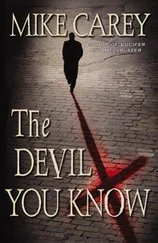Who send the lightning, and heaven’s empire sway,
The stern Lycaon* practis’d to betray.”
Ib. p. 10.
* Satan.
Since then so much poetic liberty is taken with the Devil, relating to his most early state, and the time before his fall, give me leave to make an excursion of the like kind, relating to his history immediately after the fall, and till the creation of man; an interval which I think much of the Devil’s story is to be seen in, andf which Mr. Milton has taken little notice of; at least it does not seem completely filled up; after which I shall return to honest prose again, and pursue the duty of an historian.
Satan, with hideous ruin thus supprest,
Expell’d the seat of blessedness and rest,
Looked back, and saw the high eternal mound,
Where all his rebel host their outlet found,
Restored impregnable: the breach made up,
And garrisons of angels ranged a-top
In front an hundred thousand thunders roll,
And lightnings temper’d to transfix a soul,
Terror of devils. Satan and his host,
Now to themselves as well as station lost,
Unable to support the hated sight,
Expand seraphic wings, and swift as light
Seek for new safety in eternal night.
In the remotest gulfs of dark they land:
Here vengeance gives them leave to make their stand:
Not that to steps and measures they pretend,
Councils and schemes their station to defend;
But broken, disconcerted, and dismayed,
By guilt and fright to guilt and fright betrayed j
Rage and confusion ev’ry spirit possessed,
And shame and horror swelled in ev’ry breast;
Transforming envy their essentials burns,
And the bright angel a frightful devil turns.
Thus hell began; the fire of conscious rage
No years can quench, no length of time assuage.
Material fire, with its intensest flame,
Compar’d with this, can scarce deserve a name;
How should it up to immaterials rise?
“When we ‘re all flame, we shall all fire despise.
This fire outrageous, and its heat intense,
Turns all the pain of loss to pain of sense,
The folding flames concave and inward roll,
Act upon spirit, and penetrate the soul:
Not force of devils can its new pow’rs repel,
Where’er it burns it finds or makes a hell:
For Satan, flaming with unquenched desire,
Forms his own hell, and kindles his own fire: Vanquished, not humbled, not in will brought low 3
But, as his pow’rs decline, his passions grow:
The malice, viper-like, takes vent within,
Gnaws its own bowels, and bursts in its own sin:
Impatient of the change, he scorns to bow:
And never impotent in power till now;
Ardent with hate, and with revenge distract,
A will to new attempts, but none to act;
Yet all seraphic, and in just degree,
Suited to spirits’ high sense of misery,
Derived from loss which nothing can repair,
And room for nothing left but mere despair.
Here’s finish’d Hell! what fiercer fire can burn?
Enough ten thousand worlds to overturn.
Hell’s but the phrensy of defeated pride,
Seraphic treason’s strong impetuous tide,
Where vile ambition disappointed first,
To its own rage, and boundless hatred, cursed j
The hate’s fann’d up to fury, that to flame;
For fire and fury are in kind the same;
These burn unquenchable in ev’ry face,
And the word ENDLESS constitutes the place.
state of being! where being’s the only grief,
And the chief torture’s to be damn’d to life!
Life! the only thing they have to hate;
The finish’d torment of a future state;
Complete in all the parts of endless misery,
And worse ten thousand times than not to BE!
Could but the damn’d th’ immortal law repeal,
And devils die, there ‘d be an end of Hell;
Could they that thing called being annihilate,
There ‘d be no sorrows in a future state;
The wretch whose crimes had shut him out on high,
Could be reveng’d on God himself, and die:
Job’s wife was in the right, and always we
Might end by death all human misery;
Might have it in our choice, to be or not to be.
OF THE NAME OF THE Devil, his original, and the nature of his circumstances since he has been called by that name.
––––––––
THE SCRIPTURE IS THE first writing on earth where we find the Devil called by his own proper distinguishing denomination, DEVIL, or the Destroyer; 2 nor indeed is there any other author of antiquity, or of sufficient authority, which says anything of that kind about him.
The meaning of the word Devil is destroyer. See Pool upon Acts xiii. 10.
Here he makes his first appearance in the world, and on that occasion he is called the Serpent; but the Serpent, however since made to signify the Devil, when spoken of in general terms, was but the Devil’s representative, or the Devil in qnovis vehiculo, for that time, clothed in a bodily shape, acting under cover, and in disguise, or, if you will, the Devil in masquerade: nay, if we believe Mr. Milton, the angel Gabriel’s spear had such a secret powerful influence, as to make him strip of a sudden, and with a touch to unmask, and stand upright in his naked original shape, mere Devil, without any disguises whatsoever.
Now as we go to the scripture for much of his history, so we must go there also for some of his names; and he has a great variety of names indeed, as his several mischievous doings guide us to conceive of him. The truth is, all the ancient names given him, of which the scripture is full, seem to be originals derived from, and adapted to, the several steps he has taken, and the several shapes he has appeared in, to do mischief in the world.
Here he is called the Serpent, Gen. iii. 1.
The Old Serpent, Rev. xii. 9.
The Great Red Dragon, Rev. xii. 3.
The Accuser of the Brethren, Rev. xii. 10.
The Enemy, Matt. xiii. 39.
Satan, Job i., Zech. iii. 1, 2.
Belial, 2 Cor. vi. 15.
Beelzebub, Matt. xii. 24.
Mammon, Matt. vi. 24.
The Angel of Light, 2 Cor. xi. 14.
The Angel of the Bottomless Pit, Rev. ix. 11.
The Prince of the Power of the Air, Eph. ii. 2.
Lucifer, Isa. xiv. 12.
Abaddon or Apollyon, Rev. ix. 11.
Legion, Mark v. 9.
Joke God of this World, 2 Cor. iv. 4.
The Foul Spirit, Mark ix. 25.
The Unclean Spirit, Mark i. 27.
The Lying Spirit, 2 Chron. xxx.
The Tempter, Matt. iv. 3.
The Son of the Morning, Isa. xiv. 12.
But to sum them all up in one, he is called in the New Testament plain DEVIL; all his other names are varied according to the custom of speech, and the dialects of the several nations where he is spoken of: but in a word, Devil is the common name of the Devil in all the known languages of the earth. Nay, all the mischiefs he is empowered to do, are in scripture placed to his account, under the particular title of the Devil, not of Devils in the plural number, though they are sometimes mentioned too; but in the singular it is the identical individual Devil, in and under whom all the little Devils, and all the great Devils, if such there fye, are supposed to act; nay, they are supposed to be governed arid directed by him. Thus we are told in scripture of the works of the Devil, 1 John iii. 8; of casting out the Devil, Mark i. 34; of resisting the Devi], James iv. 7; of our Saviour being tempted of the Devil, Matt. iv. 1; of Simon Magus, a child of the Devil, Acts xiii. 10; the Devil came down in great wrath, Rev. xii. 12; and the like. According to this usage in speech we go on to this day, and all the infernal things we converse with in the world, are fathered upon the Devil, as one undivided simple essence, by how many agents soever working: everything evil, frightful in appearance, wicked in its actings, horrible in its manner, monstrous in its effects, is called the Devil; in a word, Devil is a common name for all devils; that is to say, for all evil spirits, all evil powers, all evil works, and even all evil things: yet it is remarkable the Devil is no Old Testament word, and we never find it used in all that part of the Bible but four times, and then not once in the singular number, and not once to signify Satan as it is now understood.
Читать дальше












